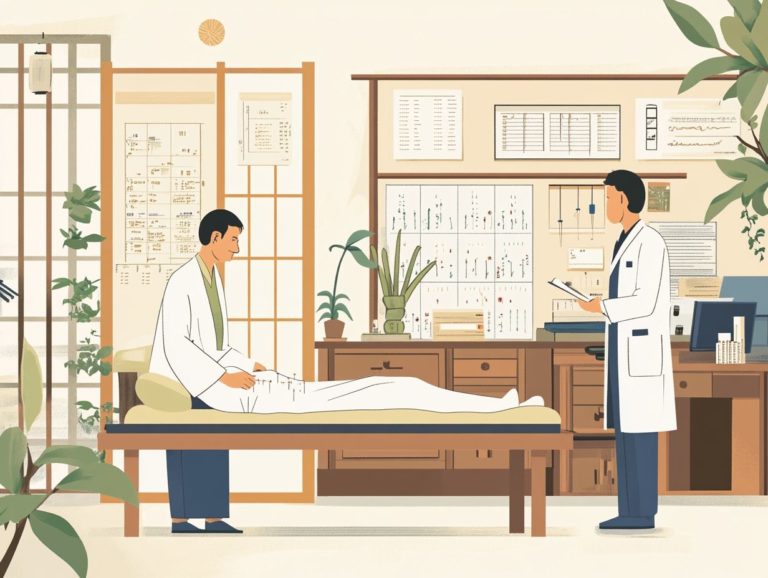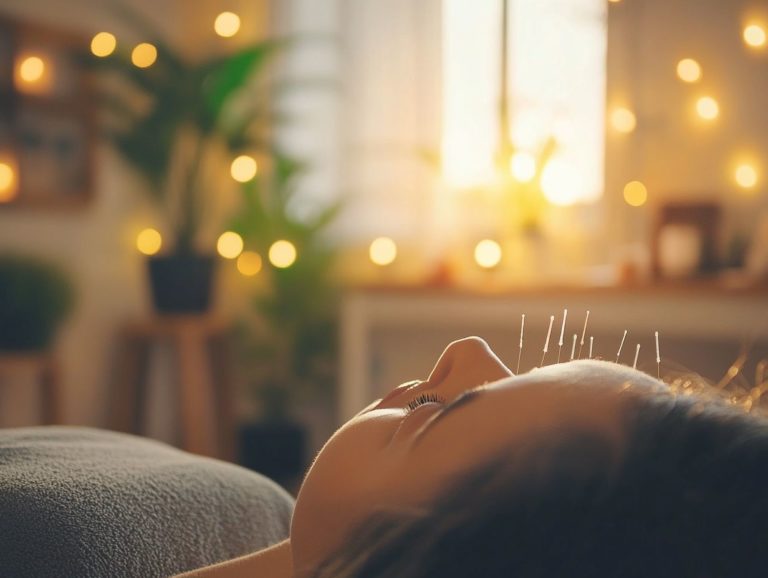Acupuncture as a Complementary Therapy: Key Insights
Acupuncture has become a sought-after complementary therapy, seamlessly marrying ancient traditions with contemporary health demands. Discover the amazing benefits that await you!
This article delves into the essence of acupuncture and its role in enhancing other treatments, revealing why it appeals to so many. Uncover the diverse benefits both physical and mental as well as the specific conditions that acupuncture can effectively address.
Find out what to anticipate during a session and how to locate a qualified acupuncturist. Explore how this holistic approach can enrich your wellness journey.
Contents
- Key Takeaways:
- Understanding Acupuncture as a Complementary Therapy
- Benefits of Acupuncture
- Conditions that Can Benefit from Acupuncture
- What to Expect During an Acupuncture Session
- Finding a Qualified Acupuncturist
- Frequently Asked Questions
- What is acupuncture and how does it work?
- Is acupuncture considered a complementary therapy?
- What are the key insights about acupuncture as a complementary therapy?
- Are there any potential side effects of acupuncture?
- How long does it take to see results from acupuncture?
- Is acupuncture covered by insurance?
Key Takeaways:

Acupuncture is a form of complementary therapy that can work alongside other treatments to enhance their effectiveness. It offers both physical and mental health benefits, making it a popular choice for various conditions, including respiratory issues. Finding a qualified acupuncturist is crucial; consider their qualifications and experience before beginning treatment.
Understanding Acupuncture as a Complementary Therapy
Acupuncture, a cornerstone of Traditional Chinese Medicine (TCM), is a holistic therapy designed to elevate your well-being by restoring balance within your body. It addresses a variety of health concerns.
This time-honored practice focuses on stimulating specific acupuncture points to regulate the flow of qi, which means life energy, promoting healing that beautifully complements conventional medical treatments.
What is Acupuncture?
Acupuncture is an elegant therapeutic technique rooted in Traditional Chinese Medicine. FDA-approved needles are inserted into specific acupuncture points to stimulate the flow of qi throughout your body.
This ancient practice is based on the idea that your body contains a network of pathways, called meridians, which carry this energy. When these pathways become blocked or imbalanced, a range of health issues can arise.
Using various acupuncture techniques, practitioners focus on targeted points. For example, LI4, found on the hand, is known to alleviate headaches, while ST36, located on the leg, enhances energy levels and aids digestion.
Each acupuncture session is tailored to your unique needs, addressing conditions like stress, chronic pain, or digestive disorders, ultimately fostering holistic well-being and restoring balance in your life.
How it Complements Other Treatments
Acupuncture serves as a remarkable complement to other treatments. It offers a non-invasive method for pain management, anxiety relief, and tackling insomnia, often enhancing the overall effectiveness of conventional therapies, as highlighted in acupuncture for women’s health: key insights.
This ancient practice integrates well with modern medicine, providing you with a holistic strategy that addresses both your physical and emotional well-being.
Techniques like laser acupuncture and electroacupuncture showcase the versatility of this practice. They allow practitioners to customize treatment plans specifically for your individual needs.
By fostering a balanced approach, you may experience improved outcomes, whether you re grappling with chronic pain or navigating the complexities of mental health issues.
Integrating such therapies not only aids in symptom relief but also reduces reliance on pharmaceuticals, paving a more sustainable path toward your wellness.
Benefits of Acupuncture

The benefits of acupuncture go far beyond simple pain relief. They encompass a wide array of physical and mental health enhancements that foster holistic wellness and alleviate stress.
By integrating this practice into your routine, you can positively influence your immune system and elevate your overall vitality.
Start your journey to better health with acupuncture today!
Physical and Mental Health Benefits
Acupuncture can transform your health. It effectively manages chronic pain and offers relief from anxiety and insomnia.
By strategically placing needles, you can reduce pain from conditions like arthritis and migraines. Many find acupuncture particularly helpful for managing stress and promoting emotional balance.
For digestive health, acupuncture helps with issues like irritable bowel syndrome and indigestion, restoring harmony in your body.
With its many benefits, acupuncture is a valuable tool for enhancing your overall well-being.
Conditions that Can Benefit from Acupuncture
Various conditions can benefit from acupuncture, including chronic pain, anxiety, insomnia, and digestive issues. This versatile therapy effectively addresses many health challenges.
Common Ailments Treated with Acupuncture
Common ailments treated with acupuncture include stress, anxiety, insomnia, and digestive issues. This shows its effectiveness as a natural therapy.
This ancient practice focuses on clearing energy pathways in your body, often leading to significant improvements in mental and physical health.
If you’re dealing with chronic stress, regular sessions can ease anxiety and uplift your emotional health. If insomnia troubles you, expect fewer sleep disturbances and deeper rest.
Acupuncture can also help with digestive problems like bloating and irritable bowel syndrome, promoting better gastrointestinal balance.
Through targeted treatments, acupuncture empowers you to take control of your health and well-being.
What to Expect During an Acupuncture Session

During your acupuncture session, expect a thorough consultation to tailor your treatment. Various techniques will be applied based on your specific needs for optimal results.
Process and Techniques Used
Acupuncture involves inserting ultra-fine needles at specific points on your body. Techniques like moxibustion, cupping, and electroacupuncture enhance the therapeutic effects.
This whole-body approach, based on traditional Chinese medicine, aims to restore balance to your body’s energy, or qi. A qualified practitioner will identify points tailored to your health concerns.
You’ll find needle insertion is often painless, stimulating points that promote circulation and reduce pain. Moxibustion, a technique that uses heat from burning herbs to improve energy flow, and cupping therapy relieve muscle tension and enhance acupuncture’s benefits.
By integrating these techniques, acupuncture addresses physical, emotional, and mental health needs.
Finding a Qualified Acupuncturist
Finding a qualified acupuncturist is crucial for safe and effective treatment. Evaluate their qualifications and verify their certification, familiarizing yourself with relevant health regulations.
Important Considerations and Tips
When you re looking for acupuncture treatment, it s vital to consider the qualifications of your practitioner and understand your treatment objectives. Be aware of any potential risks associated with acupuncture to ensure a safe experience.
Additionally, verify that the acupuncturist is licensed and follows established safety protocols. Ask about their educational background and years of experience, as this can significantly impact the quality of care you receive.
Discussing your treatment goals helps create a personalized approach tailored to your unique health needs. Engaging in open dialogue with your practitioner will address any concerns and foster a supportive environment conducive to your healing journey.
Frequently Asked Questions

What is acupuncture and how does it work?
Acupuncture is a form of traditional Chinese medicine that involves inserting thin needles into specific points on the body. It is believed to stimulate the body’s natural healing processes and balance the flow of life energy, or qi.
Is acupuncture considered a complementary therapy?
Yes, acupuncture is often used as a complementary therapy alongside conventional medical treatments to help manage symptoms and promote overall health and wellness, as detailed in acupuncture’s role in cancer care.
What are the key insights about acupuncture as a complementary therapy?
- Acupuncture takes an overall view, considering the whole body rather than just specific symptoms.
- It emphasizes the importance of the mind-body connection in promoting health.
- Acupuncture can treat a variety of conditions, including chronic pain, stress and anxiety, headaches, and digestive issues.
Are there any potential side effects of acupuncture?
When performed by a trained and licensed practitioner, acupuncture is generally safe with minimal side effects. Some individuals may experience mild bruising, soreness, or bleeding at the needle sites, but these symptoms are rare.
How long does it take to see results from acupuncture?
The number of sessions needed to see results varies based on the individual and their condition. Some may experience improvement after just one session, while others may require several sessions for significant changes.
Is acupuncture covered by insurance?
Many insurance plans now cover acupuncture treatments. It s essential to check with your specific provider to confirm coverage and any limitations.
Don t wait start your healing journey today! Book an appointment or learn more about how acupuncture can benefit you.






